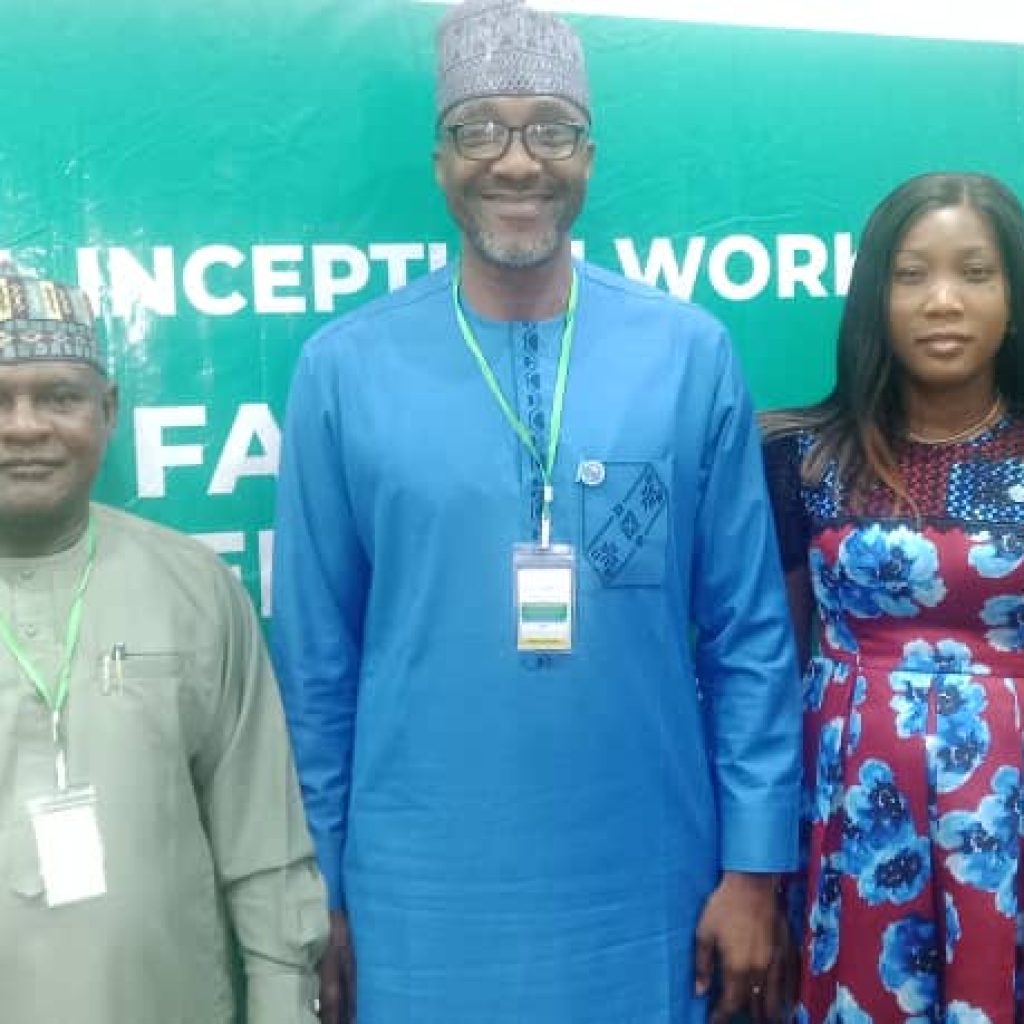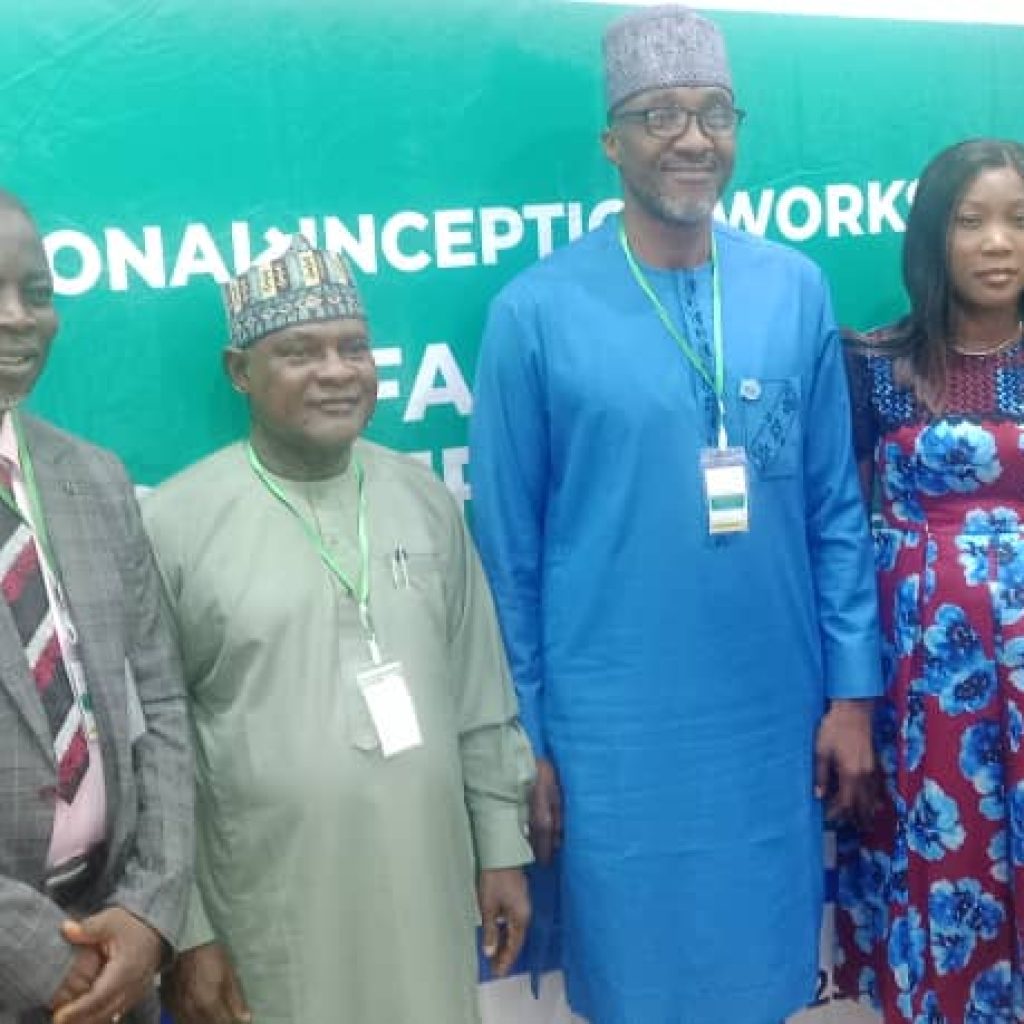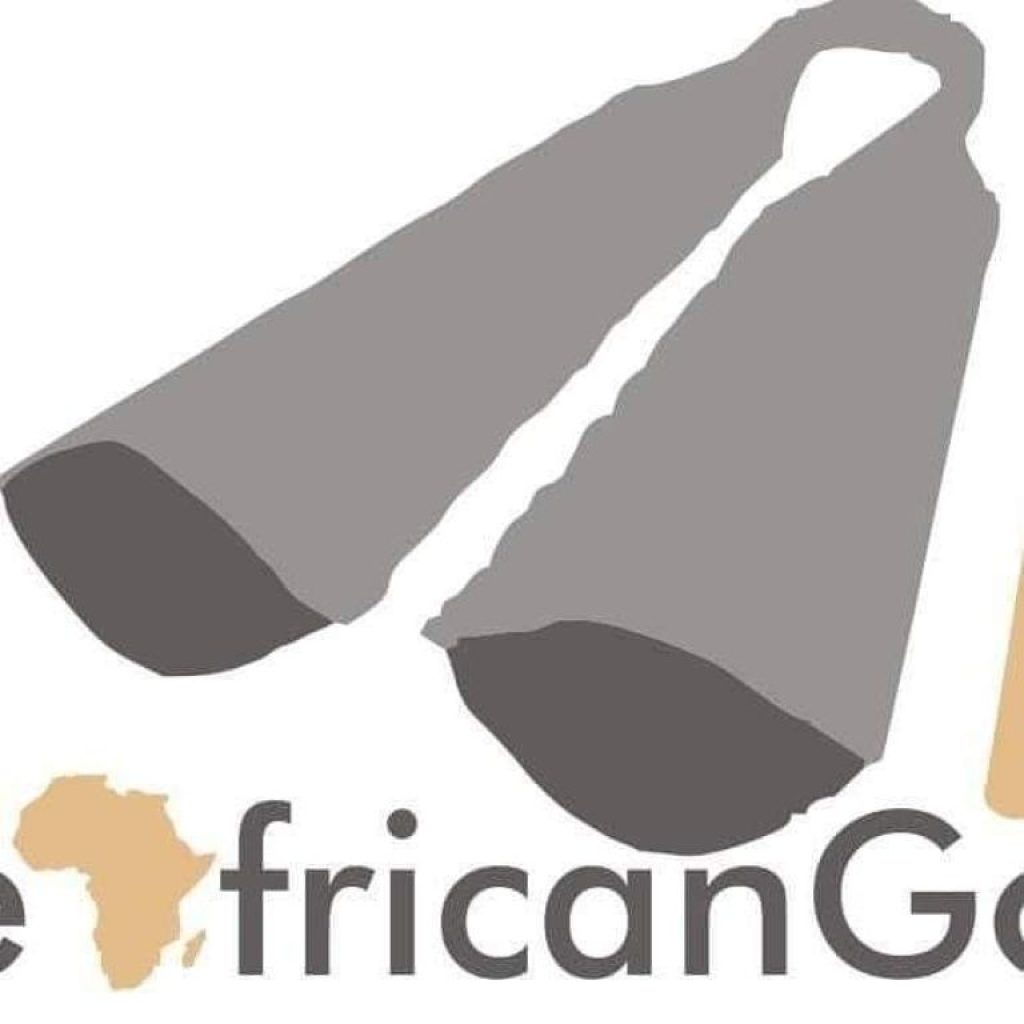
. NATIONAL INCEPTION WORKSHOP ON FOA GEF7 BIODIVERSITY PROJECT: ( L-R), Dr Ibrahim Goni, Conservator General, National Park Service of Nigeria, Ezinkwo Simon, Rep. Minister of Environment, and Ms Nifesimi Ogunkwa , Rep. of FAO Representative in Nigeria
The National Park Service of Nigeria, in collaboration with the Food and Agriculture Organization of the United Nations and other partners on Monday in Ogun State, organized a two -day National Inception Workshop on FOA GEF7 BIODIVERSITY PROJECT. The workshop is aimed at conservation biodiversityity and sustainable use of lowland forest Mosiac landscapes in Ogun, Edo, Delta, and Ondo States.
Declaring the workshop open, Minister of Environment, Malam Balarabe Abbas Lawal represented by Ezinkwo Simon Ndidi, Assistant Director, Project, Research and Statistics in the ministry thumbed up the initiative saying “Let me begin by commending the collaboration between the Global Environment Facility (GEF), the Food and Agriculture Organization (FAO), and the Federal Government of Nigeria, in launching this timely initiative aimed at safeguarding our precious forest ecosystems and biodiversity.
“This project is aligned with the vision of the Renewed Hope Agenda o. Mr. President, which emphasizes sustainable development, climate resilience, and improved livelihoods. It also supports our national commitment to the Post-2020 Global Biodiversity Framework and Nigeria’s National Biodiversity Strategy and Action Plan (NBSAP).

“Biodiversity loss in Nigeria has significant ecological, economic, and social impacts, threatening food security, livelihoods, and ecosystem stability. To this end, the Ministry is very aware of the major drivers of biodiversity loss in the country which include deforestation, agricultural expansion, illegal wildlife trade, urbanization, pollution as well as the impacts of climate change and is working assiduously with the relevant agencies to strengthen the enforcement of environmental laws including adequate public awareness programmes to protect the environment.
“This project comes at a critical time, as Nigeria strives to restore degraded ecosystems, mitigate biodiversity loss, and enhance sustainable land use systems through integrated landscape approaches. Through the Global Environment Facility (GEF) and the technical support of the FAO, it is obvious that we are making significant strides towards meeting our national and global commitments under the Convention on Biological Diversity and the Sustainable Development Goals.
Declaring the workshop open, the minister emphasized the Ministry’s unflinching support for this project and all ongoing and upcoming initiatives under the GEF-7 and GEF-8 cycles, noting “We remain committed to ensuring that the results of this and other GEF-supported projects are not only impactful but also sustainable and scalable”.
In her address, Ms. Nifesimi Ogunkua, Climate Change Specialist, who represented Mr Koffy Kouacou, FAO representative in Nigeria explained that “conservation of Biodiversity and Sustainable Use of a Lowland Forest Mosaic Landscape in Ogun, Edo, Delta, and Ondo States are critical components of this project , stating the gathering marks not just the formal start of this project, but the culmination of years of shared effort, vision, and persistence toward preserving Nigeria exceptional biodiversity and ensuring the sustainable management of our forest landscapes.
“Allow me to begin by expressing FAO deepest appreciation to the Federal Government of Nigeria for its leadership and steadfast commitment to biodiversity and ecosystem management. We recognize in particular the collaborative efforts of the Federal Ministry of Environment, the Federal Ministry of Agriculture and Food Security, the National Park Service, and the governments of Ogun, Edo, Delta, and Ondo States. Your ownership, political will, and institutional guidance are central to this project foundation and success, ” adding that
“today’s project did not emerge overnight. Its journey began in 2021, when the initial idea was conceptualized through extensive technical consultations between FAO, the Government of Nigeria, and relevant stakeholders. From its earliest phase, this project was designed to respond to national environmental priorities and global commitments under the Convention on Biological Diversity and the Kunming-Montreal Global Biodiversity Framework.”
The FAO boss reiterated that the Project Preparation Grant (PPG) phase played a critical role in transforming this idea into robust, bankable, and realistic intervention.
According to him, FAO mobilized a multidisciplinary technical team to work closely with national counterparts. We conducted stakeholder consultations at federal, state, and community levels; undertook technical feasibility assessments and baseline studies; developed detailed results frameworks and investment strategies; and carefully aligned the project with Nigeria National Biodiversity Strategy and Action Plan (NBSAP)”.
In his his goodwill message, the Conservator General, National Park Service, Dr Ibrahim Musa Goni said the workshop marks a pivotal step forward in Nigeria journey toward conserving our invaluable biodiversity and promoting the sustainable use of our natural resources.
“The project, titled “Conservation of Biodiversity and Sustainable Use of Lowland Forest Mosaic Landscapes in Edo, Delta, Ogun, and Ondo States,” aims to improve conservation, sustainable management, and restoration of Nigeria’s lowland forest landscapes while strengthening the sustainable livelihoods of the Indigenous People and Local Communities” he stressed, adding the project is indeed a promising development for Nigeria which is home to one of Africa’s largest mangrove forests, located in the Niger Delta region.
According to the NPS boss, these forests are rich in biodiversity and support a variety of life that serves as crucial breeding and nursery grounds for many marine species, which in turn sustains local fisheries.
” They are known to store crucial amounts of
carbon in their biomass and soil, playing a vital role in combating climate change. These mangroves also act as natural buffers against storm surges, flooding, and coastal erosion while providing livelihoods to local communities. However, their degradation due to deforestation, pollution, climate change, and invasive species poses several risks, not only to the local environment and economies but also to global climate stability, the CG further explained, noting
“We find ourselves at a crucial juncture where the need to conserve our natural environment has never been more urgent. Biodiversity enriches our planet, supports livelihoods, enhances ecosystem resilience, and ensures food security. The lowland forest ecosystems we are focusing on hold immense ecological and cultural value, and their preservation is vital for the well-being of our communities and the health of our environment.
“As a Service, we take immense pride in our role as custodians of our nation’s natural heritage. The Okomu National Park, which will serve as the focal point for this project, encapsulates our commitment to sustainable conservation. Our partnership with the FAO underscores a shared vision to empower local communities, promote sustainable practices, and restore ecological balance in these crucial regions. This initiative aligns with the renewed hope agenda of the present administration, emphasizing environmental sustainability, poverty reduction, and food security.
Calling out all participants to engage actively in the discussions and technical sessions during the workshop, urged participants to leverage the knowledge and experiences of the critical situation of our environment to develop effective strategies that will yield tangible outcomes.
Paying special tributes and appreciation to . President, Asiwaju Bola Ahmed Tinubu, GCFR (Jagaban Borgu) and other members of his cabinet, , the Honourable Minister for Environment, Malam Balarabe Abbas Lawal, the Honourable Minister for Agriculture and Food Security, Senator Abubakar Kyari, Minister for Budget and National Planning, Senator Abubakar Atiku Bagudu and Minister for Women Affairs, Hajiya Imaan Sulaiman-Ibrahim for their unwavering support and commitment to the protection and conservation of our natural treasures, Dr Ibrahim Goni also thanked all NPs partners
particularly the FAO, GEF, and other stakeholders, particularly the governors of the participating states; Ogun, Edo, Ondo, and Delta, for the support and interest shown in the project.
.
” Together, we can foster a collaborative spirit that resonates beyond this workshop, promoting sustainable practices that will benefit both nature and humanity.
“Let us harness the rich value of our heritage, knowledge, and commitment to chart a successful course for the GEF 7 project. May this workshop serve as a platform for inspiring dialogue, innovative strategies, and actionable solutions that will resonate within our communities and ensure a sustainable future for generations to come.
“Together, let us cultivate hope, resilience, and a renewed promise to protect our precious environment,” Dr Goni assured.

Other goodwill messages from representatives of Ogun, Delta, Ondo, and Edo states also promised to make good use of the knowledge gained from the workshop to develop their states’ agricultural and forest landscapes
KEY TAKEAWAYS: Nigeria has some of the richest floral and faunal biodiversity in Africa. The country’s wide variety of ecosystems-ranging from semi- arid savannah in the north and lowland rainforest across the Niger Delta region in the south, host over 864 bird species , 117 species of amphibians, 203 reptile species, over 775 fish species , 285 mammals and over 4, 715 plant species.
However, Nigeria’s biodiversity is highly threatened , with 309 threatened species on the IUCN Red List in 20133. Biodiversity loss is driven by land use change and habitat loss associated with agricultural expansion and unsustainable practices , over- exploitation of resources, environmental pollution, and climate change.
In this context, Nigeria sought to participate in the GEF7 Agriculture, Forestry and other and Land Use ( Biodiversity) through Conservation of Biodiversity and Sustainable Use of a Lowland Forest Mosaic Landscape in Ogun, Edo, Delta and Ondo States
